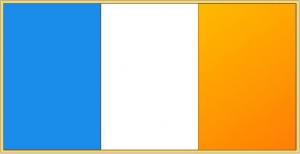Corundy
The name of the greatest peninsula of the eastern Pallathantic that stretches from the Asdaurian mainland, chiefly Throvy, westwards into the sea. The name derives from the Yophenthean word for córondë, 'king, ruler.' Corundy was one of the successor-kingdoms of the Yophenthean Empire. Corundy is a peninsula that juts from the western edge of Asdauria into the sea. To the north is the Pallathantic Sea and to the south is the Memnosian Sea. The account of Ardawan or the 'Ardawandali' reports that about seven thousand years ago, King Ardawan of antediluvian Balimarutha escaped the ravages of the Great Flood with his followers in the highlands of what is modern Corundy. After the waters resided, he gathered survivors and built up the flood survivor state of Kalama. Centuries later, immigrating Midringian Tribes overtook the decaying Kalaman Civilization and built up Midretasso with its capital in Cetibrymio. During the centuries of the Midretassene Empire, the myth of the hero Addan and of the numinous god Vimal became steeped in hearts of the people. This empire expanded and conquered the Ithatian Isles, but was in turn conquered by the Yophenthean Empire.
History
Corundy has a rich history of princes, heroes, and artistic treasures. Modern Corundy is completely liberated from the former rule of the Gorcorumbese Empire and the Kalikán Empire. Eastern Corundy is subject to the Aurician Empire and the Republic of Johaulia is all that stands between Aurice and the other principalities of the peninsula. Aurice has refrained from gobbling up the princedoms of Corundy so as not to appear tyrannical like Gorcorumb and prefers to manipulate rulers and people behind the scenes. Johaulia is considered a puppet-state of Aurice and many Johaulians deeply resent statements to this effect.
Climate and Geography
The climate of Corundy is warm, sometimes very warm in the summer until monsoons from the Memnosian Sea temper the heat in late summer. It is cool and rainy in the winter when cold storms of rain drift in from the north. Cypress trees, Stone Pines, olives, and vineyards dot the rural hills of Corundy. Corundians wines compete for prestige with those of Ithatia, Ebinóë, Throvy, and Glaye. Olive orchards produce oil shipped around the world. Riots of hills and small mountains flow from the south through the land to the north. Central Corundy is hilly plateau, held up by the Thugad and Damisatta Mountains. In this region sits Lake Vimala, the purview of the numinous god Vimal whose fame persists from Midretassene times. Citys and towns down the coasts of this deep lake that drains over great cataracts by the city of Johaulia into the Pallathantic Sea.
Politics
The influence of the Aurician Empire which controls two provinces in eastern Corundy cannot be overstated. Aurice menaces and shelters Corundy from any possible encroachments of the Gorcorumbese Empire to the west. Gorcorumb nowadays is no longer seen as genuine threat and Aurice is viewed as a potential conqueror. But the Empire of Magdala and the Republic of Ithatia threaten to intervene if Aurice tarnishes the sovereignty of the independent states of Corundy. Johaulia is the most prestigious Republic of Corundy and also closely allied to Aurice out of political expediency. Johaulians love their artwork and their entire government is centered on artistic excellence. Their alliance with Aurice has caused some to question their cultural hegemony over Corundy, but Aurice has not openly threatened the independent states of Corundy for the past century and the status quo remains at least in theory. Behind the diplomatic courtesy, however, Aurice uses its economic and political clout to force governments and local corpora mercia to make agreements favorable to Aurician merchants and interests. Aurice would like to see a united Corundy under Johaulia, but does not openly foster this agenda.
Languages of Corundy
Major Languages spoken in 2750 IR in the peninsula of Corundy and Environs There are three groups of languages in Corundy. Ithatian is the oldest and has been spoken in Corundy the longest. Corundian Ithatian is a different dialect from insular Ithatian. Tassan, Throvian are descended from the ancient Midretassene Language. Corundian comes from the language of the Yophenthean conquerors. Ferruvicarese is related to ancient Thybidite and thus distantly related to Midretassene. Tassan and Throvian share some mutual intelligibility, but Tassans are staunchly proud of their language and culture and Tassan vies with Throvian as the language of diplomacy for the peninsula. Auricians have been careful to employ ambassadors and diplomats who speak fluent Tassan so as to avoid any appearance of denigrating the sovereignty of the Johaulian Republic. Tassan is the language of choice for operas throughout Corundy and the Pallathantic Sea.
Economy
Corundy is well-placed for trade and commerce. Despite its rolling hills that may dampen land transport, its many vibrant sea ports have commerce with the nations of the Pallathantic and Memnosia. Corundy is seated along with Throvy on the western end of the lucrative caravan routes through Asdauria to Sungo and elsewhere in the far east. The map of trade routes shown here uses blue for sea are river routes and red for land routes. Sky routes are reserved for light cargo with high commercial value as sky vessels, even modern titancraft air vessels, do not have the capacity to warrant their cost. The map shows the central importance of Corundy in Pallathantic Trade with the far east and Zephasia to the south.
Flags of Corundy
Noble Republic of Aurice
The provinces of Zamiria are subject to Aurice. Throvian is spoken widely in the coast towns and cities while Tassan is spoken in the hills and plateau.
Republic of Johaulia
